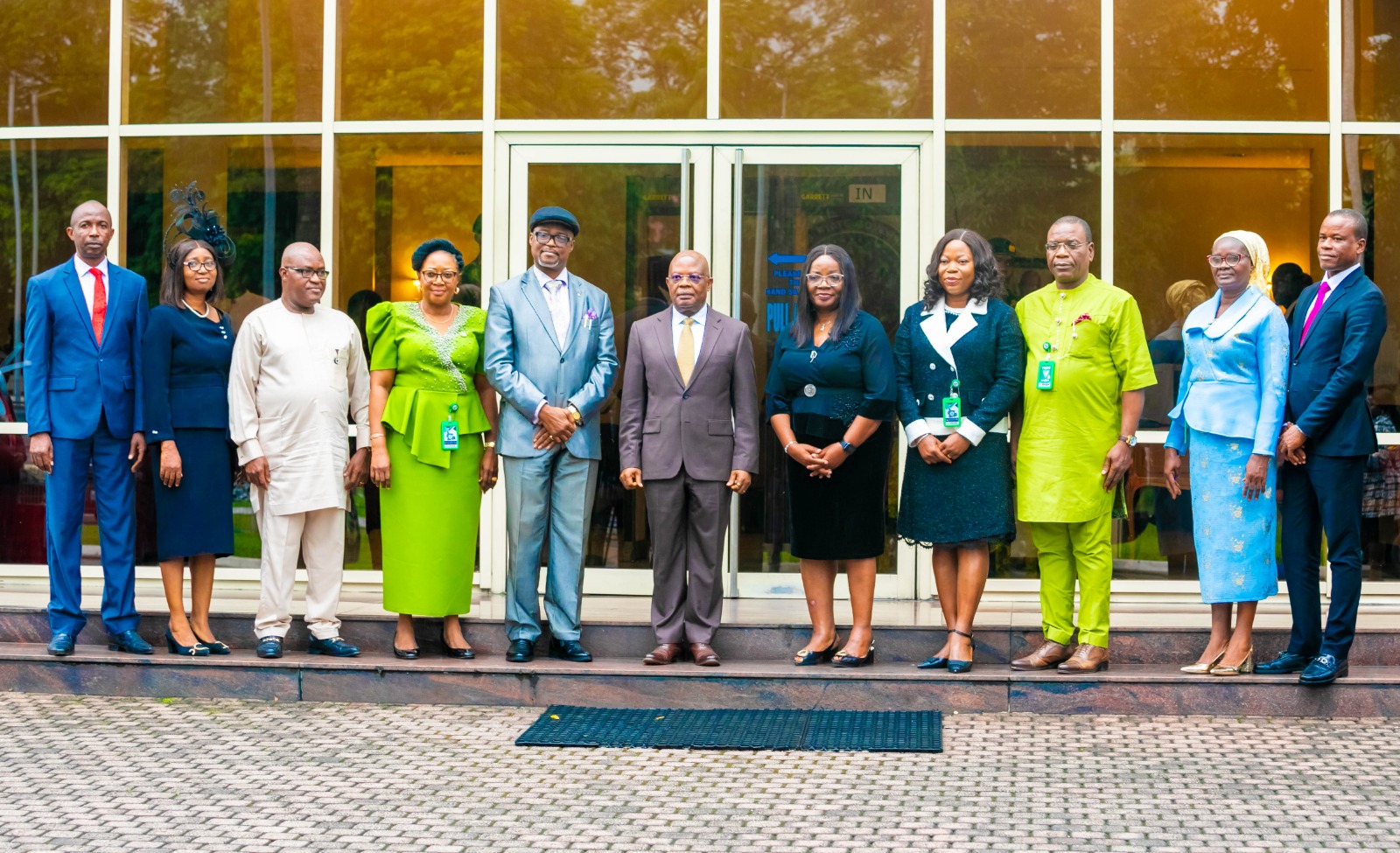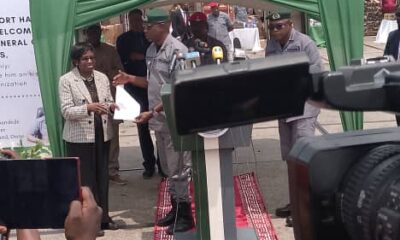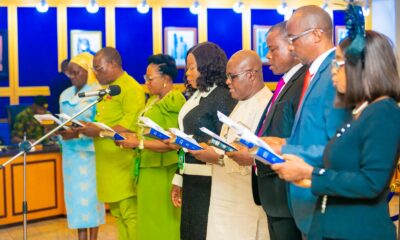Featured
Rivers Election Tragedy: IPAC Exposes GOC’s Dirty Role …Urges Buhari To Call Sarham To Order

With the dust yet to settle in the ill-fated rescheduled Presidential election held across the country, last Saturday, more than 77 political parties in Rivers State have exposed the ignoble Army brutality visited on Rivers people, commandeered by the General Officer Commanding 6 Division of the Nigerian Army, Major General Jamil Sarham.
The political parties, under the aegis of the Rivers State chapter of the Inter-Party Advisory Council (IPAC) in a press briefing held in Port Harcourt, yesterday, described Saturday, 23rd February, 2019, as “black, bloodiest and saddest day in the election history of the state” as, according to them, the Army decided to be overly partisan in breach of their abiding duty to be neutral and provide security for the electoral process.
In a statement jointly signed by the state chairmen of all 76 political parties and read by its Public Relations Officer, Comrade Kukang Ledum Joseph, Rivers IPAC said the Army’s action in Rivers State was in total defiance to the assurance given by the Acting Director of Defence Information, Brigadier General John Agim that the Army will not be directly involved in the 2019 General Election process.
They noted that Governor Nyesom Wike and several other stakeholders had repeatedly alerted the nation on the planned partisan involvement of the Army in the election process in Rivers State, adding that all these apparently fell on deaf ears as GOC, Jamil Sarham flagrantly fraternized with the leaders of the All Progressives Congress (APC) in Rivers State to rig, snatch election materials, harass collation officers and force them to allocate bogus results to the APC.
According to them, rather than respond to these weighty allegations against the GOC, invectives were poured on Wike and PDP stakeholders, calling them false alarmists crying wolf where there were none.
“But alas, here we are with the disastrous consequences of the failure of the military authorities and the INEC to reprimand and call to order the GOC and his soldiers of destruction that they deployed to Rivers State for unlawful election duties”, the statement read.
According IPAC, “What on earth can justify the killing of as many as 16 unarmed civilians by the Army in a rustic community, which members were barely insisting on their participatory rights and freedom to exercise their franchise in the face of the brazen onslaught by APC thugs to scuttle the electoral process”.
The Rivers IPAC further alleged that aside the brutal killing of over 18 innocent civilians, including an INEC ad-hoc staff and an NYSC member, the soldiers prevented the general election from holding in Akuku-Toru LGA and parts of Asari-Toru and Degema LGA.
“Major General Jamil Sarham’s soldiers also supported APC thugs to snatch election materials and prevented the elections from holding in the whole of Bonny LGA and parts of Ahoada West and Okrika LGAs”, they said while also lamenting the mayhem visited on Emohua and Ikwerre LGAs by the marauding soldiers.
The over 77 political parties said it was obvious that the direct partisan involvement of the Army led to the cancellation of elections in six local government areas of the state, wondering the legitimacy of the results eventually turned in and declared by INEC for Rivers State in the face of the wanton killings, snatching of election materials and the other electoral maladies resulting from the elections across the state.
The group expressed fears that by brazenly betraying the public trust, the Army can no longer be trusted by the people of Rivers State to be neutral in the electoral process in the state, adding that even the forthcoming Governorship and state House Assembly elections in Rivers State was also at risk.
According to the Rivers IPAC: “On Thursday, 7th February, 2019, the Acting Director of Defence Information, Brigadier General John Agim briefed the press in Abuja, and assured Nigerians that the Army will not be directly involved in the 2019 general election process.
“According to him: ‘…the Armed Forces of Nigeria wish to re-affirm its neutrality, impartiality and strict adherence to professional code of conduct before, during and after the general election.
‘Therefore, we would like to reiterate that the Armed Forces of Nigeria will carry out its constitutional duties with zero tolerance to unprofessional conduct. No military personnel are expected to fraternize with any political parties and associations.’
The IPAC said that “in the week and days preceding last Saturday’s rescheduled elections, the governor of Rivers State and several other stakeholders repeatedly alerted the nation on the planned partisan involvement of the Army in the election process in Rivers State.
“Specifically, it was revealed that the General Officer Commanding the 6 Division of the Nigeria Army, Major General Jamil Sarham was fraternizing with leaders of Rivers State APC to rig, snatch election materials, harass collation officers and force them to allocate bogus results to the APC.
“Despite the wide publicity they attracted, neither the Chief of Army Staff, the Chairman of the independent National Electoral Commission (INEC) nor the principal accused, Major General Jamil Sarham reacted to these weighty and very troubling allegations.
“Instead, the governor of Rivers State and the PDP stakeholders were maligned and regarded as false alarmists crying wolf where there were none but alas, here we are with the disastrous consequences of the failure of the military authorities and the INEC to reprimand and call to order the GOC and his soldiers of destruction that they deployed to Rivers State for unlawful election duties.
“Thus, Saturday, 23rd February, 2019, will forever remain in the memory of Rivers people as a black and bloody Saturday in the election history of the state simply because the Army decided to be overly partisan in breach of their abiding duty to be neutral and provide security for the electoral process.
“What on earth can justify the killing of as many as 16 unarmed civilians by the army in a rustic community, which members were barely insisting on their participatory rights and freedoms in the face of the brazen onslaught by APC thugs to scuttle the electoral process?”
The Rivers IPAC appealed to President Muhammadu Buhari, Chief of Army Staff, Lt-Gen Tukur Buratai and the international community to prevail on the Army to stay away from election duties in Rivers State and allow the police to perform their constitutional responsibilities for peaceful, free, fair and credible elections in the state.
Featured
Rivers A Strategic Hub for Nigeria’s Blue Economy -Ibas …Calls For Innovation-Driven Solutions

The Administrator of Rivers State, Vice Admiral (Rtd.) Ibok-Ete Ibas, has emphasized the need for innovation-driven strategies, strategic partnerships, and firm policy implementation to fully harness the vast potential of the blue economy.
Speaking during a courtesy visit by participants of Study Group 7 of the Executive Course 47 from the National Institute for Policy and Strategic Studies (NIPSS) at Government House, Port Harcourt, on Monday, Ibas highlighted the importance of diversifying Nigeria’s economy beyond oil by leveraging maritime resources to create jobs, enhance food security, strengthen climate resilience, and generate sustainable revenue.
The Administrator, according to a statement by his Senior Special Adviser on Media, Hector Igbikiowubo, noted that with coordinated efforts and innovative solutions, the blue economy could serve as a catalyst for inclusive growth, economic stability, and long-term environmental sustainability.
“It is estimated that a fully developed blue economy could generate over $296 million annually for Nigeria, spanning fisheries, shipping and logistics, marine tourism, offshore renewable energy, aquaculture, biotechnology, and coastal infrastructure,” he stated.
“We must transition from extractive practices to regenerative, inclusive, and innovation-driven solutions. This requires political cohesion, intergovernmental collaboration, robust infrastructure, and institutional capacity—all of which must be pursued with urgency and intentionality,” he added.
Ibas urged sub-national governments, particularly coastal states, to domesticate the national blue economy framework and develop tailored strategies that reflect their comparative advantages.
He stressed that such efforts must be guided by disciplined planning, regulation, and investment to maximize the sector’s potential.
Highlighting Rivers State’s pivotal role, the Administrator outlined its strategic advantages as follows:
•Nearly 30% of Nigeria’s total coastline (approximately 853km)
•Over 40% of Nigeria’s crude oil and gas output
•More than 33% of the country’s GDP and foreign exchange earnings
•416 of Nigeria’s 1,201 oil wells, many located in marine environments
•Two of Nigeria’s largest seaports, two oil refineries, and the Nigerian Liquefied Natural Gas (NLNG) terminal in Bonny Island—one of Africa’s most advanced gas facilities
Despite these opportunities, Ibas acknowledged challenges such as pollution, coastal erosion, illegal oil refining, unregulated fishing, inadequate infrastructure, and maritime insecurity.
He reaffirmed his administration’s commitment to institutional reforms, coastal zone management, and inter-agency collaboration to build a governance structure that supports a sustainable blue economy.
“Sustainability must be embedded in our development models from the outset, not as an afterthought. We are actively exploring partnerships in maritime education, aquaculture development, port modernization, and renewable ocean energy. We welcome knowledge-sharing engagements like this to refine our strategies and enhance implementation,” he said.
He urged the NIPSS delegation to ensure their findings translate into actionable recommendations that address the sector’s challenges.
Leader of the delegation, Vice Admiral A.A. Mustapha, explained that the visit aligns with their strategic institutional tour mandate on the 2025 theme: “Blue Economy and Sustainable Development in Nigeria: Issues, Challenges, and Opportunities.”
The group is engaging stakeholders to deepen understanding of policy efforts and institutional roles in advancing sustainable development through the blue economy.
Featured
INEC To Unveil New Party Registration Portal As Applications Hit 129

The Independent National Electoral Commission (INEC) has announced that it has now received a total of 129 applications from associations seeking registration as political parties.
The update was provided during the commission’s regular weekly meeting held in Abuja, yesterday.
According to a statement signed by the National Commissioner and Chairman of the Information and Voter Education Committee, Sam Olumekun, seven new applications were submitted within the past week, adding to the previous number.
“At its regular weekly meeting held today, Thursday 10th July 2025, the commission received a further update on additional requests from associations seeking registration as political parties.
“Since last week, seven more applications have been received, bringing the total number so far to 129. All the requests are being processed,” the commission stated.
The commission revealed the introduction of a new digital platform for political party registration. The platform is part of the Party Financial Reporting and Auditing System and aims to streamline the registration process.
Olumekun disclosed that final testing of the portal would be completed within the next week.
“INEC also plans to release comprehensive guidelines to help associations file their applications using the new system.
“Unlike the manual method used in previous registration, the Commission is introducing a political party registration portal, which is a module in our Party Financial Reporting and Auditing System.
“This will make the process faster and seamless. In the next week, the commission will conclude the final testing of the portal before deployment.
“Thereafter, the next step for associations that meet the requirements to proceed to the application stage will be announced. The commission will also issue guidelines to facilitate the filing of applications using the PFRAS,” the statement added.
In the meantime, the list of new associations that have submitted applications has been made available to the public on INEC’s website and other official platforms.
Featured
Tinubu Signs Four Tax Reform Bills Into Law …Says Nigeria Open For Business

President Bola Tinubu yesterday signed into law four tax reform bills aimed at transforming Nigeria’s fiscal and revenue framework.
The four bills include: the Nigeria Tax Bill, the Nigeria Tax Administration Bill, the Nigeria Revenue Service (Establishment) Bill, and the Joint Revenue Board (Establishment) Bill.
They were passed by the National Assembly after months of consultations with various interest groups and stakeholders.
The ceremony took place at the Presidential Villa, yesterday.
The ceremony was witnessed by the leadership of the National Assembly and some legislators, governors, ministers, and aides of the President.
The presidency had earlier stated that the laws would transform tax administration in the country, increase revenue generation, improve the business environment, and give a boost to domestic and foreign investments.
“When the new tax laws become operational, they are expected to significantly transform tax administration in the country, leading to increased revenue generation, improved business environment, and a boost in domestic and foreign investments,” Special Adviser to the President on Media, Bayo Onanuga said on Wednesday.
Before the signing of the four bills, President Tinubu had earlier yesterday, said the tax reform bills will reset Nigeria’s economic trajectory and simplify its complex fiscal landscape.
Announcing the development via his official X handle, yesterday, the President declared, “In a few hours, I will sign four landmark tax reform bills into law, ushering in a bold new era of economic governance in our country.”
Tinubu made a call to investors and citizens alike, saying, “Let the world know that Nigeria is open for business, and this time, everyone has a fair shot.”
He described the bills as not just technical adjustments but a direct intervention to ease burdens on struggling Nigerians.
“These reforms go beyond streamlining tax codes. They deliver the first major, pro-people tax cuts in a generation, targeted relief for low-income earners, small businesses, and families working hard to make ends meet,” Tinubu wrote.
According to the President, “They will unify our fragmented tax system, eliminate wasteful duplications, cut red tape, restore investor confidence, and entrench transparency and coordination at every level.”
He added that the long-standing burden of Nigeria’s tax structure had unfairly weighed down the vulnerable while enabling inefficiency.
The tax reforms, first introduced in October 2024, were part of Tinubu’s post-subsidy-removal recovery plan, aimed at expanding revenue without stifling productivity.
However, the bills faced turbulence at the National Assembly and amongst some state governors who rejected its passing in 2024.
At the NASS, the bills sparked heated debate, particularly around the revenue-sharing structure, which governors from the North opposed.
They warned that a shift toward derivation-based allocations, especially with VAT, could tilt fiscal balance in favour of southern states with stronger consumption bases.
After prolonged dialogue, the VAT rate remained at 7.5 per cent, and a new exemption was introduced to shield minimum wage earners from personal income tax.
By May 2025, the National Assembly passed the harmonised versions with broad support, driven in part by pressure from economic stakeholders and international observers who welcomed the clarity and efficiency the reforms promised.
In his tweet, Tinubu stressed that this is just the beginning of Nigeria’s tax evolution.
“We are laying the foundation for a tax regime that is fair, transparent, and fit for a modern, ambitious Nigeria.
“A tax regime that rewards enterprise, protects the vulnerable, and mobilises revenue without punishing productivity,” he stated.
He further acknowledged the contributions of the Presidential Fiscal Policy and Tax Reform Committee, the National Assembly, and Nigeria’s subnational governments.
The President added, “We are not just signing tax bills but rewriting the social contract.
“We are not there yet, but we are firmly on the road.”
-
Politics3 days ago
Atiku’s Exit No Problem To PDP – Makinde
-

 News3 days ago
News3 days agoRivers Police Arrest Notorious Cultist, Recover Sophisticated Ammunition
-

 Rivers3 days ago
Rivers3 days agoNigeria Customs Intercepts 16 Containers Worth Over N20bn
-

 News3 days ago
News3 days agoIbas Inaugurates RSIEC, Service Commissions, Healthcare Board In Rivers …Charges Appointees To Embrace Principles Of Service
-
Rivers3 days ago
Monarch Cautions Youths Against Illicit Drug Consumption
-
Rivers3 days ago
Okrika Administrator Seeks To Connect Okujagu Ama To National Grid … Donates 30 Life Jackets To Okujagu Ama Boat Drivers
-

 News3 days ago
News3 days agoNIMASA Shuts Two Lagos Terminals Over Security Breach
-
Politics3 days ago
Alleged Money Laundering: Fayose Has No Case To Answer, Court Tells EFCC

